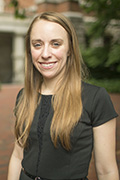 Laura Dolbow ’17 has won a 2018 Law360 Distinguished Writing Award, which recognizes excellence and clarity in legal writing, in the law school category for her Note, “A Distinction without a Difference: Convergence in Claim Construction Standards,” published in the Vanderbilt Law Review in April 2017.
Laura Dolbow ’17 has won a 2018 Law360 Distinguished Writing Award, which recognizes excellence and clarity in legal writing, in the law school category for her Note, “A Distinction without a Difference: Convergence in Claim Construction Standards,” published in the Vanderbilt Law Review in April 2017.
The writing awards were announced by the Burton Awards, a nonprofit legal writing awards program run in association with the Library of Congress and co-sponsored by the American Bar Association that recognizes law students, legal scholars and practicing attorneys for outstanding legal writing.
Dolbow is one of 15 law students nationwide to be honored with a 2018 Law360 Distinguished Legal Writing Award through the annual award, which recognizes excellence in scholarly and professional legal writing each year. Winners were selected by a panel of judges and law professors. They will be honored on May 21 at an awards ceremony at the Library of Congress in Washington, D.C.
“Laura is a gifted writer, and her note is an excellent piece of scholarship. By conducting a broad survey of patent interpretation cases, she has truly advanced our understanding of courts’ behavior in this crucial context,” said Associate Dean for Research Chris Serkin, who nominated Dolbow’s paper for the award. Dolbow’s paper also won the Morgan Prize for the most outstanding piece of student writing published in the Vanderbilt Law Review during the academic year.
Dolbow’s paper addresses the two different standards historically applied by the U.S. Patent and Trademark Office and federal district courts to interpret patent claims. While the PTO applies the “broadest reasonable interpretation” to construe patent claims, districts courts apply the Phillips standard, which is based on a 2005 Federal Circuit Court ruling in Phillips v. AWH Corp., that clarified the proper claim construction inquiry in district court cases. Dolbow conducted an empirical examination of the legal authority cited in claim-construction decisions in recent inter partes review proceedings at the PTO, and her study revealed that “in practice, the PTO and the district court standards have converged.” She concludes that “Given this convergence, abolishing the dual system and recognizing a unified standard of claim construction would better serve the goals of the patent system–increasing efficiency, uniformity, and confidence in patent rights.”
Dolbow also received the Gellhorn-Sargentich Award from the American Bar Association’s Section on Administrative Law for her article, “Appropriating Agencies: How Congress Leverages Legislative History to Direct Agency Action,” written for the Legal Scholarship seminar taught by Owen Jones, who holds Vanderbilt’s New York Alumni Chancellor’s Chair in Law. That paper also won the law school’s Weldon B. White Prize, which each year recognizes the graduate “who submitted the best paper in fulfillment of the law school’s advanced writing requirement.”
Dolbow won the Founder’s Medal for the Class of 2017, and she was the recipient of the Ethel and Cecil Roberts Scholarship. She is currently serving as a law clerk to Judge Timothy B. Dyk of the U.S. Court of Appeals for the Federal Circuit.
The Burton Awards were established in 1999 by the Burton Foundation to honor the finest accomplishments in law, including writing, reform, public service and interest, regulatory innovation, and lifetime achievements in the profession. They are funded by the Burton Foundation and named for its founder and chair, William C. Burton, a partner at Sagat/Burton and a former assistant attorney general and assistance special prosecutor for New York State. Burton is the author of the first legal thesaurus ever written for the legal profession, Burton’s Legal Thesaurus, now in its 5th edition.